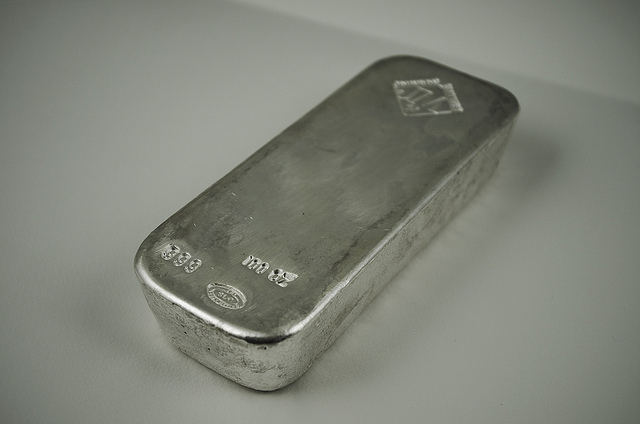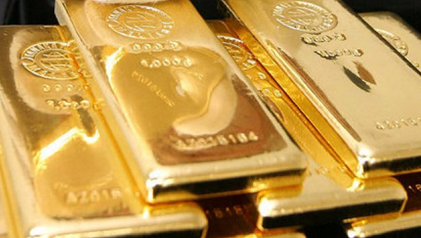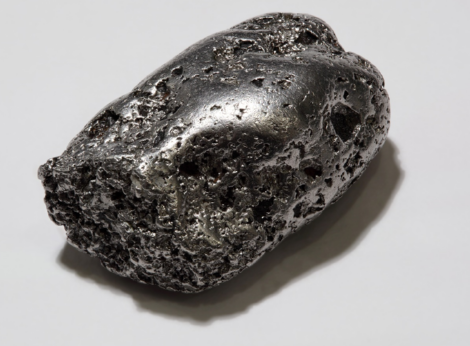Nyheter
The real lesson of Barclay’s fine

 On Friday 23 May news broke that Barclays Bank had been fined 26 million pounds, nearly $44 million, in a case related to a trader who pushed the gold price lower at the fix on 28 June 2012. The trader, Daniel Plunkett, had $43 million in two-year-old gold options that he had sold to a client which were coming close to being in the money; he placed a 60,000 ounce sell order at the fix to try to keep the price from rising to a level at which the options would be in the money.
On Friday 23 May news broke that Barclays Bank had been fined 26 million pounds, nearly $44 million, in a case related to a trader who pushed the gold price lower at the fix on 28 June 2012. The trader, Daniel Plunkett, had $43 million in two-year-old gold options that he had sold to a client which were coming close to being in the money; he placed a 60,000 ounce sell order at the fix to try to keep the price from rising to a level at which the options would be in the money.
News of the penalty to Barclays set tongues wagging. The news comes out amid a great deal of confusion over the demise of the silver fixing and the need to replace it as a benchmark silver price; ongoing restructuring of the bullion banking business; and a rise in the shrill commentary about the London precious metals fixes being consistently manipulated and distorted.
The last point misses the real lesson of the Barclays’ fine.
Barclays was not fined for trying to manipulate the gold fix, nor for successfully doing so. Barclays was fined for lack of supervision of a gold trader who tried to manipulate the fix one day in 2012.
People who apparently know virtually nothing about how precious metals trade have made a cottage industry out of claims that the dealers in the inner ring of the fix have an undue advantage, being able to profit by trading based on their knowledge of the volumes of buy and sell orders they are receiving from clients. One recent suit alleging silver fix price manipulation was just thrown out of U.S. courts for lack of evidence, but that has done nothing to stop the business. The Barclay’s incident points to the extent to which this is not really the case, however.
The key point is that Barclay’s gold traders participating in the fix did not know what their own gold options trader was doing, let alone what their outside clients were doing. So much for coordinated manipulation across the decades.
One trader succeeded one day to push the gold price down and went undetected by his own trading colleagues at his bank. When the client complained Barclays investigated, made the client whole, and let the trader go. In the ensuing two years it also apparently has put in place systems to protect against employees doing such things again and going undetected. Those do not sound like the actions of a bank systematically gaming the fix.
Perspective
In the middle of the 1980s a Drexel Burnham broker in southern Florida named Ted Butler manipulated the frozen and concentrated orange juice market, creating an unregistered pool of his clients money that he traded on a coordinated basis to control orange juice prices. (This was prior to the movie Trading Places.) The CFTC spotted the strange trades, investigated, and came after both the broker and Drexel. Drexel paid a fine for nonsupervision and let Butler go. Trying for leniency with the CFTC, Butler offered to show the CFTC on-going misfeasance in the silver market by Drexel.
The CFTC investigated, and found two matched trades which Drexel had undertaken with another dealer in order to allow the other dealer to square its silver books at the end of the trading day, so that it was completely hedged overnight.
Drexel paid a fine for those two trades. Permanently banned from the futures industry as a result of his orange juice caper, Butler became the voice crying out against silver market manipulation, first by Drexel, then Merrill, and later JP Morgan over the past 26 years or so. He is the source of the thought that banks have massive uncovered short positions. Interestingly, the fact that dealers used match trades back then to square their books at the end of each day points to the fact that banks run hedged books.
So now we know of three people who have been banned permanently from commodities trading. One is Butler, who has spent his life since being banned alleging that the silver market is manipulated. The second is Bill Murphy, who was banned in the early 1990s and went on to be one of the founders of GATA, spending the rest of his life alleging that the gold market is manipulated.
And now we have Daniel Plunkett, who tried to hit the gold fix one day. We doubt Mr. Plunkett will follow his predecessors’ examples and try to set himself up as an expert on market manipulation, blaming others with no real evidence to support any accusations, but his one-day action has given them fuel to keep their cottage conspiracy theory industry alive for a while longer.
[box]Denna analys är producerad av CPM Group och publiceras med tillstånd på Råvarumarknaden.se.[/box]
Disclaimer
Copyright CPM Group 2012. Not for reproduction or retransmission without written consent of CPM Group. Market Commentary is published by CPM Group and is distributed via e-mail. The views expressed within are solely those of CPM Group. Such information has not been verified, nor does CPM make any representation as to its accuracy or completeness.
Any statements non-factual in nature constitute only current opinions, which are subject to change. While every effort has been made to ensure that the accuracy of the material contained in the reports is correct, CPM Group cannot be held liable for errors or omissions. CPM Group is not soliciting any action based on it. Visit www.cpmgroup.com for more information.
Nyheter
Guld stiger till över 3500 USD på osäkerhet i världen

Investerare har den senaste tiden sökt sig till guld som en säker hamn i en konfliktfylld värld. Trumps ständiga attacker på både vänner och fiender har skapat en stor oreda. Med en ökad sannolikhet för en sänkt ränta i USA så blir guld ännu mer tilltalande. Kring midnatt mellan torsdag och fredag svensk tid passerade den gula ädelmetallen 3500 USD per uns på Comex-börsen.

Nyheter
Lyten, tillverkare av litium-svavelbatterier, tar över Northvolts tillgångar i Sverige och Tyskland

Amerikanska Lyten, världsledande inom litium-svavelbatterier, har tecknat ett bindande avtal om att förvärva Northvolts återstående tillgångar i Sverige och Tyskland. I affären ingår batterifabrikerna Northvolt Ett och Ett Expansion i Skellefteå, Northvolt Labs i Västerås samt planerade Northvolt Drei i tyska Heide. Dessutom förvärvas alla immateriella rättigheter (IP) från Northvolt.
De tillgångar Lyten nu tar över har tidigare värderats till cirka 5 miljarder dollar och omfattar 16 GWh i befintlig batteriproduktionskapacitet samt ytterligare 15 GWh under uppbyggnad. Transaktionen, som är helt finansierad med eget kapital från privata investerare, väntas slutföras under det fjärde kvartalet 2025, förutsatt myndighetsgodkännande.
Återstart av verksamheter och jobbtillfällen
Lyten planerar att omedelbart återuppta verksamheten vid anläggningarna i Skellefteå och Västerås efter att affären slutförts. Bolaget har även för avsikt att återanställa en stor del av den personal som tidigare sagts upp från Northvolt och ser långsiktiga sysselsättningsmöjligheter som en nyckel till fortsatt framgång.
– Det här är ett avgörande ögonblick för Lyten. Förvärvet ger oss de anläggningar och den svenska kompetens som krävs för att snabbare möta den kraftigt ökande efterfrågan på våra litium-svavelbatterier, säger Dan Cook, vd och medgrundare av Lyten.
Positivt mottagande från svenska regeringen
Förvärvet välkomnas även från politiskt håll.
– Det här är en vinst för Sverige och för våra ambitioner inom energi och industriell innovation, säger Ebba Busch, Sveriges vice statsminister.
Fortsatt global expansion
Förvärvet i Sverige och Tyskland är en del av Lytens större strategi att bygga en stark närvaro i både Europa och Nordamerika. Tidigare i år har Lyten också köpt Northvolt Dwa i Polen – Europas största tillverkare av batterilagringssystem – samt förvärvat Northvolts IP-portfölj för energilagring. Bolaget har även uttryckt intresse för att ta över Northvolt Six i Quebec, Kanada.
Batterier för framtiden – även i rymden
Lyten har utvecklat en egen teknikplattform baserad på 3D-grafen och fokuserar på nästa generations litium-svavelbatterier – en teknik med potential att revolutionera batteribranschen. Förutom försäljning till drönar- och försvarsindustrin förbereder Lyten även en batterilansering på den internationella rymdstationen ISS senare i år.
En svensk medgrundare, Lars Herlitz
Även om Lyten är amerikanskt så finns det en svensk medgrundare, Lars Herlitz.
Nyheter
Lundin Gold hittar ny koppar-guld-fyndighet vid Fruta del Norte-gruvan
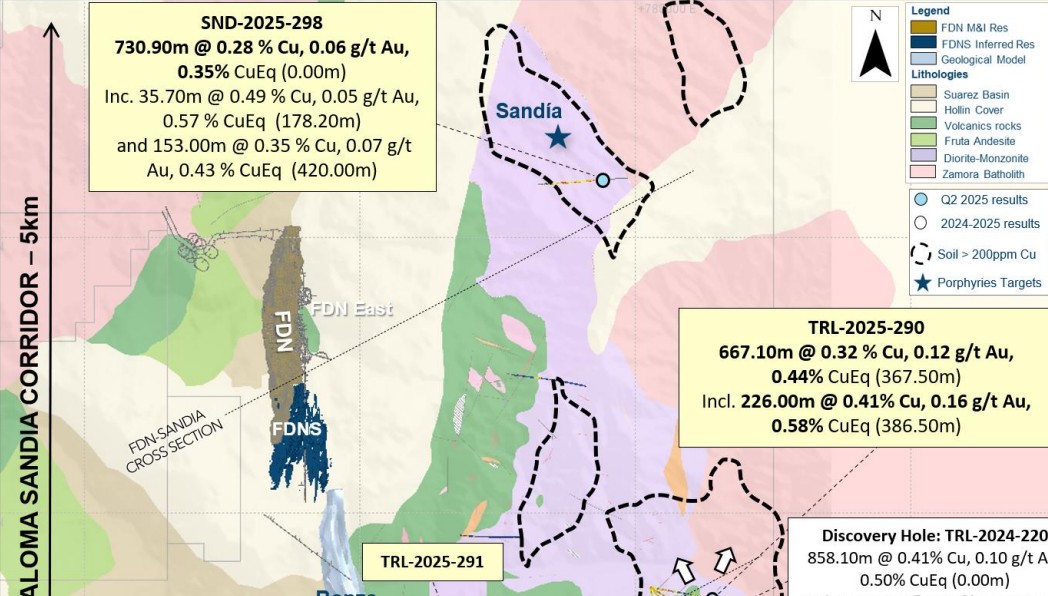
Gruvbolaget Lundin Gold har presenterat starka resultat från sin pågående prospektering vid Fruta del Norte-gruvan i Ecuador. Bolaget meddelar att man har utökat mineraliseringen vid Trancaloma samt upptäckt ett nytt koppar-guld-porfyrsystem vid Sandia, endast fyra kilometer norr om Trancaloma.
Enligt vd Ron Hochstein visar resultaten på den stora, ännu outnyttjade potentialen i området. ”Vi har nu bekräftat att mineraliseringen vid Trancaloma är kontinuerlig och sträcker sig både på djupet och i sidled. Samtidigt har vi upptäckt ett helt nytt system vid Sandia, vilket stärker bilden av en lovande porfyrkorridor direkt intill vår befintliga verksamhet,” säger han.
Bland höjdpunkterna från borrprogrammet märks ett borrhål vid Trancaloma som visade 667 meter med en koppar-ekvivalent (CuEq) på 0,44 %, inklusive 226 meter med 0,58 % CuEq. Vid Sandia påträffades 730 meter med 0,35 % CuEq från markytan, vilket bekräftar förekomsten av ett andra porfyrsystem.
Utforskningsprogrammet för 2025 är det största hittills inom området kring Fruta del Norte, med över 48 000 meter borrning genomförd hittills. Fokus ligger på att identifiera nya fyndigheter i närheten av den befintliga gruvan.
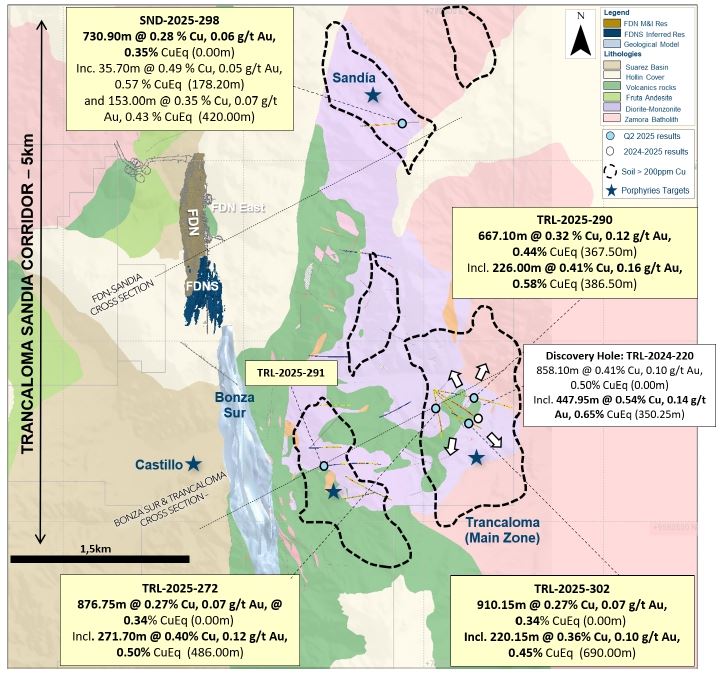
-

 Nyheter3 veckor sedan
Nyheter3 veckor sedanUSA inför 93,5 % tull på kinesisk grafit
-

 Nyheter3 veckor sedan
Nyheter3 veckor sedanFusionsföretag visar hur guld kan produceras av kvicksilver i stor skala – alkemidrömmen ska bli verklighet
-

 Nyheter3 veckor sedan
Nyheter3 veckor sedanWestinghouse planerar tio nya stora kärnreaktorer i USA – byggstart senast 2030
-

 Nyheter3 veckor sedan
Nyheter3 veckor sedanRyska militären har skjutit ihjäl minst 11 guldletare vid sin gruva i Centralafrikanska republiken
-
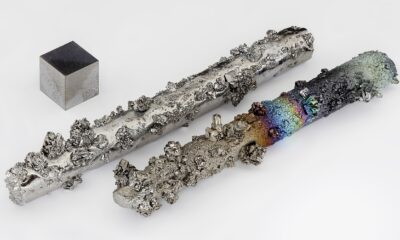
 Nyheter4 veckor sedan
Nyheter4 veckor sedanEurobattery Minerals förvärvar majoritet i spansk volframgruva
-

 Nyheter1 vecka sedan
Nyheter1 vecka sedanKopparpriset i fritt fall i USA efter att tullregler presenterats
-

 Nyheter1 vecka sedan
Nyheter1 vecka sedanLundin Gold rapporterar enastående borrresultat vid Fruta del Norte
-

 Nyheter3 veckor sedan
Nyheter3 veckor sedanKina skärper kontrollen av sällsynta jordartsmetaller, vill stoppa olaglig export



